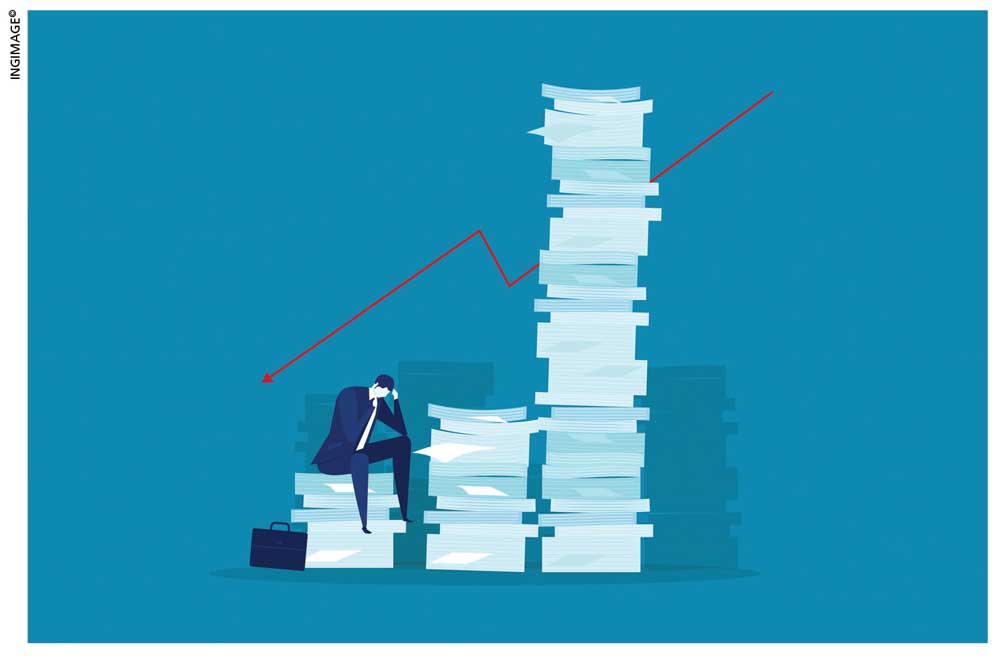HUSTLE CULTURE
THE DARK SIDE OF SUCCESS
Manilka Ediriweera explains why it’s important to avoid the hustle culture

In the ever-changing business world, the appeal of hustle culture is a magnetic force that pulls you in. It lures you in with promises of success, wealth and admiration, all tied together with the ribbon of hard work.
Safe to say, hustle culture has emerged as the gold standard for what constitutes ‘success’ in recent times. But there is also a dark side to it.
If you’re an ambitious professional, you’ve probably heard the mantra that success requires sweat, long hours and an unwavering focus on your goals. You’ve probably been told about this. This mindset is known as hustle culture, and it has gained immense popularity with CEOs, entrepreneurs and social media influencers who sing praises about the grind.
Even in the media, people are relentlessly encouraged to work themselves to the bone, to never stop and take a break in their pursuit of success.
What do you see when you are on social media?
You’re likely to be bombarded with stories of go-getters hustling from dawn till task, juggling work, side gigs and family, all this while wearing a smile on their faces.
These narratives have made the pursuit of productivity the ultimate prize – a badge of honour one can achieve in modern times. What hustle culture tells us is that we can’t make it big without constantly toiling and hustling our way through life.
However, behind the glorified facade of hustle culture is a grim reality – one that we can’t afford to ignore anymore.
One of the main problems with hustle culture is that it’s based on the conviction that success is the fruit of hard work and sacrifice. And while this is true, the problem is that hustle culture glorifies overworking, often at the price of one’s wellbeing and relationships.
When we constantly push ourselves to work harder and longer, we often tend to neglect our personal lives, which results in dire consequences to our health and relationships. This is one of the main criticisms against the hustle mentality, with people now asserting that such as culture is not only unsustainable but harmful to our physical and mental wellbeing too.
So it’s not surprising that many people out there are rethinking the grind.
But before that, let’s understand what makes hustle culture so appealing and why we glorify exhaustion and celebrate busyness as a mark of success.
Part of the appeal seems to lie in the promise of success. Take a successful entrepreneur who boasts about his 80 hour working week or the tech magnate whose social media narratives paint the picture of success with only a few hours of sleep each night. It’s this promise that working harder and longer will eventually propel us to the apex of our careers that fuels hustle culture.
All these narratives tell us that success is an equation where the more hours you work, the more success you achieve.
However, studies have linked this mentality of overwork to severe problems such as burnout, anxiety, depression and reduced productivity.
And it doesn’t end there...
Hustle culture can also cast a shadow over personal relationships, stifle creativity, and end up stealing life experiences and the little moments that make it all worthwhile.
Think of hustle culture as a windup toy or racing car that runs on your hard work: the roaring engine and your speed will propel you forward, making you feel excited and great. But eventually, the tank will run dry and the car will screech to a halt. And like a car that needs fuel to run, you too need rest and self-care to avoid burning out and coming to a stop.
The thrill of juggling multiple projects at once, fuelled by sleepless nights, little to no rest and endless cups of coffee, may initially give you an adrenaline rush and make you feel invincible. However, the constant demand for higher levels of productivity can tear at what drew you into your work in the first place.
However, there’s no need to worry because there is a silver lining!
You don’t have to let hustle culture define what success means to you; instead, redefine your understanding of accomplishments without discarding hard work. It’s all about understanding and recalibrating your values and priorities.
Setting boundaries, embracing and enjoying leisure without feeling guilty, and prioritising self-care and personal relationships aren’t a sign of weakness or failure; they’re necessary to break away from the shackles of hustle culture.
You can still achieve success while leading a satisfying life where happiness doesn’t have to be sacrificed for victory.
Success doesn’t hinge on how long we work and it’s not merely an equation where work hours equal achievement. So take a step back and reflect on your values and priorities – because it’s time to rethink the hustle!




